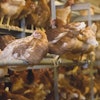
To make more sales, poultry producers should market their products as local when possible.
At the 2022 Chicken Marketing Summit in Braselton, Georgia, Jennifer Bartashus, senior analyst at Bloomberg Intelligence, spoke about current economic and consumer trends relevant to the poultry industry.
During that presentation, she mentioned consumers are more interested in local food than ever before.
Bloomberg’s data shows 52% of consumers think local perishables are of higher quality, 49% believe they’re fresher and last longer and 42% are willing to pay more for local foods. A local product gets an extra bonus, Bartashus said, because it doesn’t travel as far and is perceived as carrying a smaller ecological cost.
That’s a recipe for an easy win for chicken and poultry products.
Poultry is local
Chicken, turkey and eggs are not produced everywhere in the United States, but are often processed and packaged close to major population centers.
According to WATT Global Media data, most poultry growing and processing takes place in the Southeast and Midwest. However, significant operations are based in the mid-Atlantic states and the southern West Coast, too.
Bartashus said consumers don’t maintain a firm definition of the "local" term and can’t really differentiate between a product grown in their hometown or 100 miles away. This is an opportunity for the chicken industry to merely change packaging and presentation and gain new customers.
Differentiation
As a commodity product, there’s often little differentiation between chicken products shoppers see in the store. Poultry growers and processors, perhaps for fear of scrutiny from marauding animal activists, prefer to remain private, too.
This trend is steadily reversing as chicken companies recognize the value of their branding and the potential customer loyalty it creates. Shoppers are smarter than perceived. More than ever, they want to know where the food on their plates came from and if it was produced in a manner of which they approve.
For both the shopper making snap decisions in the store and thoroughly researching their every bite, knowing what town or state the product came from is an assurance of trustworthiness.
Moreover, let’s face it, everyone likes to support the home team.


















